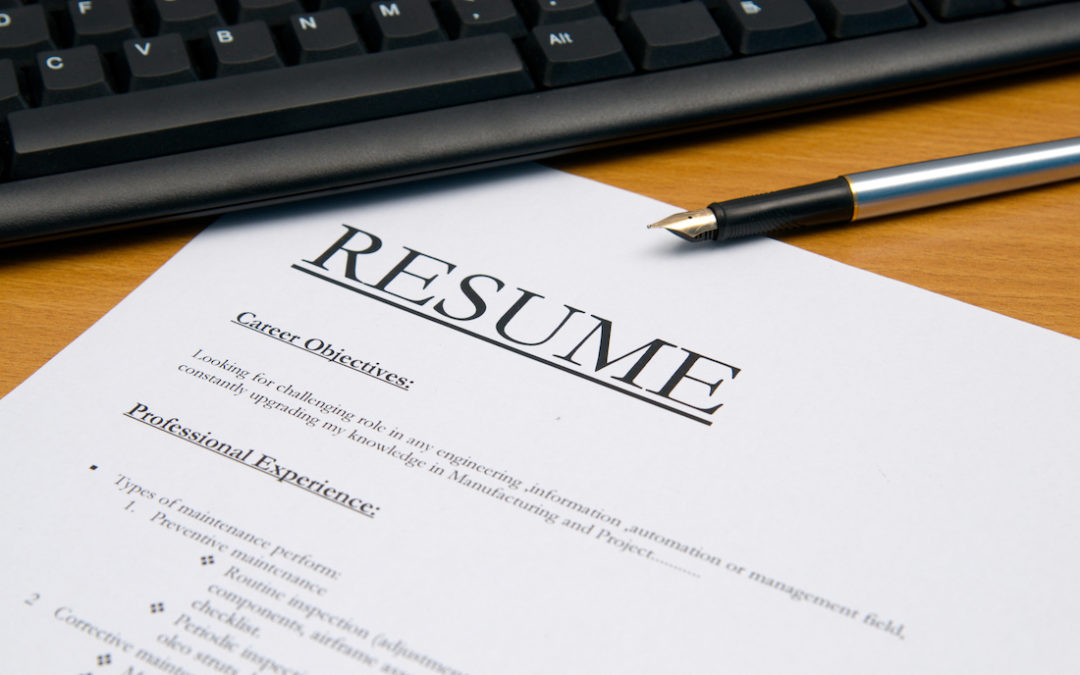
Apr 25, 2018 | Resume Writing Tips
How many times have you used your resume to apply for a job you really wanted and received an email indicating that the employer selected a different candidate?
It definitely doesn’t feel great.
And it leaves you wondering what you could have been done differently to get a favorable response.
What we can tell you is that the more convincing your words are, the more likely you are to get a call back. Follow the tips below to impress any employer by using resume power words.
Use Action Words That Tell What You Have Done
Many job seekers tend to include their jobs along with all of the duties and responsibilities for each role.
This does not catch the eye of employers.
One of the best practices in resume writing includes strengthening your accomplishments (and positioning) by using resume power words in the form of action verbs.
For instance, words like “directed,” “created,” and “increased” demonstrate that you are able to get things done.
It’s best to follow these words with specific goals that you’ve achieved, such as “increased revenue by 25%” or “directed a team of 25-30 people.” In this case, numbers are just as powerful as words so use them wisely as well.
One of the most important things a prospective employer wants to know is how you can make them more profitable.
Tip: Show employers what you can bring to their company by using resume power words that highlight your value and achievements.
Include Words That Are Specific to the Company Vision
This strategy will not only illustrate to employers how good you look on paper, but it will also demonstrate that you’ve done your research.
You can identify key words that are important to the company’s overall mission by browsing their website.
For example, if you see that an employer takes pride in finding creative solutions for their clients, then you can include in your resume that one of your strengths is creative problem-solving.
Tip: Spark an emotional trigger in your hiring employer by adding resume power words that hold personal meaning to the company.
Show Your Value by Listing Unique Skills and Qualities
Anyone can say that they’re hard-working, dependable, and responsible.
But you want to be the one to “wow” employers by including qualities that aren’t as easy to come by.
Your goal is to prove how difficult it would be to replace you. To accomplish this, use and combine resume power words that demonstrate exceptional strengths or enhance common ones, such as “pragmatic thinker.”
Or you can focus on highlighting your expertise by using words that explain what you can do better than the average person. For example, “detail-driven editor.”
Tip: Be creative by showing employers what you’re really great at including the traits that make you the best candidate for the job.
Get the Job with Resume Power Words
Your resume should stimulate an employer’s interest before they meet you.
This is why you should take time to carefully craft a compelling representation using powerful words that highlight your unique brand and value.
If you still feel stuck, consider hiring a career coach to help you successfully land a job.
Feel free to contact us today so we can help you create an interview-winning resume that influences favorable hiring decisions!

Feb 13, 2018 | Career Coaching, Resume Writing Tips
Writing a great resume is essential if you want to be hired. 98 percent of job applicants are eliminated during the original resume screening phase.
If you can’t get the interview, how are you going to get the job? You can’t afford to make mistakes, and you especially can’t afford to have these types of resumes land on your potential employer’s desk.
Anything with Misspellings or Bad Grammar
You may think a typo is just a typo. But it’s so much more than that.
Your prospective employer has no idea who you are. When they see spelling and grammar mistakes on your resume, that’s how you will be judged. Mistakes like these communicate to prospective employers that you are either careless or unintelligent.
Make a favorable first impression by taking a few extra minutes to review your resume — it’s time well spent. Simply put, make sure you don’t let one mistake cost you the job.
“Biographical Resumes”
A stellar resume provides all of the information hiring managers need and none of the information they don’t. An example of a bad resume is one that lists every one of your achievements as a filler.
Prospective employers probably don’t care about your SAT scores or the AP classes you took in high school.
A Resume with Gaps that Haven’t Been Explained
Many people have been unemployed at one point or another. So gaps on a resume aren’t uncommon, but that doesn’t mean you don’t need to explain them.
If you have a gap on your resume, you should mention it in the cover letter. Refusing to bring it up may raise a red flag for potential employers, instead of letting you define your own career trajectory.
The best resumes aren’t known for their absence of gaps: they’re known for their ability to openly and honestly explain them. If this applies to you, be sure to discuss any employment gaps in your cover letter.
Anything Poorly Formatted
You might not think the format of your resume is a big deal. But if you care about how prospective employers view you, take the format of your resume seriously.
If you have a poorly formatted resume, you are communicating a lack of attention to detail. Because of this, it’s possible you will not be seen as a serious candidate.
Think about it from your employer’s perspective: a serious candidate would take the extra 30 minutes to look over their resume to make sure it’s free of errors. To prospective employers, a candidate that submits sloppy or poorly formatted career documents are not worthy of consideration.
A Resume that Lacks Focus
We get it: most people take jobs because they need to support themselves. But employers like to think applicants submit employment applications with some grand purpose.
Use your career marketing collateral to demonstrate to employers that you are pursuing a very specific career goal. In doing so, you’ll most likely be perceived as a growth-oriented candidate, which will play a huge role in your future success.
Develop the Right Type/s of Resumes
If you’re interested in crafting an interview-winning resume, you should reach out to the professionals.
We offer everything from resume and cover letter services to LinkedIn Profile development at a competitive price. The job hunt is hard, and scanning your resume for potential mistakes can make it even harder.
If you’re ready to land your next job, contact us today!

Sep 6, 2017 | Resume Writing Tips
If you’re in the process of looking for a job, you’ve probably spent hours editing your resume, obsessing over every word, trying to get it just right.
But did you know that your resume could be read by a machine before it ever reaches a member of human resources?
That’s right.
Most large companies use some form of tracking system which scans your resume for keywords.
This analysis is used to assign a ranking, which determines your chance of getting to the next stage.
If your resume doesn’t pass the test, it may never reach a human.
To make sure you have the best chance of getting your dream job, you need to stay ahead of the game.
I’m here to tell you exactly why using resume keywords is essential if you want to land interviews.
Ready to tweak that resume for the final time?
Let’s do it.
1. Ensure Your Resume Won’t Be Discarded at the First Stage
We’ve already touched on this, but let’s go into a little more detail.
Most companies now use an applicant tracking system, or ATS, to scan your resume before having it looked at by a human.
This means that you could be perfect for a job, but if you haven’t included the right keywords, noone will ever read your application. In some cases, even using the wrong form of a word ― like ‘manager’ instead of ‘leader’ (or vice versa) can hurt your chances.
It’s really important to look at the keywords used in the job description and person specification for the job and mirror these on your resume. These are likely to be the same keywords used in the ATS.
Don’t get carried away with adding resume keywords, though.
There’s no point in getting past the tracking system if your resume reads poorly to an actual human.
2. Resume Keywords Help You Focus on the Most Important Skills Needed
It’s tempting to list everything you’ve ever done on your resume, but this looks unprofessional and vague.
Honing in on specific keywords helps you to narrow down exactly which skills you need to include on your resume, making it much more focused.
More hiring managers won’t care that you played the flute in high school, or attend tennis club on the weekend ― and you can be sure that the ATS won’t.
3. Using The Right Language Shows You’re on the Same Page as the Hiring Manager
Managers like to hire candidates who they feel already understand the role and the industry.
Speaking the right language in your resume demonstrates that you’re part of their world and reassures them that you’re experienced.
Even if you say all the right things, using the wrong language can be detrimental. It’s the difference between saying, “I have effective merchandising skills,” and “I can make pretty window displays.”
Using the right keywords makes you stand out as a professional ― to the managers and the machines.
Why Keywords are Essential to your Job Search
Writing a great resume just isn’t enough. You need to make sure you include the right resume keywords to avoid having your application rejected at the first hurdle.
Start by listing some of the keywords that you see most often in job descriptions, then work them into your resume in an organic way.
You’ll get more interviews, and you might even start to find writing your resume less daunting!

Aug 22, 2017 | Resume Writing Tips
You’ve just found a job posting that’s absolutely perfect for you. You have all the required experience and skills, the company looks great, and the salary is attractive.
Got your resume all polished up? Great! But before you apply, take time to learn how to write a cover letter that will catch the recruiter’s attention.
1. Get Off to a Good Start
It’s worth taking the time to research who’s going to read your cover letter, so that you can address it directly, but use caution. A female manager or HR director might not take kindly to a cover letter that starts out “Dear Sir” — or worse, “Dear Mr. Jones.”
If you don’t know the contact person’s gender, either use their full name or go with a gender-neutral greeting like “Dear Hiring Manager.” Otherwise, you risk having your application deleted before it has even been read.
2. Tell Them Why You Are the Perfect Fit
Your resume outlines the educational background and professional experience you would bring to the position, so don’t waste the recruiter’s time reiterating that information.
Instead, explain how your previous accomplishments will help you achieve the stated objectives of the position. Use statements like “With 5 years of experience as a sales professional, I will grow revenue for your company,” or “My interpersonal skills and ability to multitask make me an ideal candidate for the receptionist position.”
This means you should tailor the cover letter to each individual position you’re applying for. Recruiters can spot a form letter a mile away.
3. Mirror Their Language
Many larger companies now use software to screen applications before they’re even sent to actual recruiters.
To maximize your chances of getting through this first filter, check the job posting for keywords, and use those keywords in your cover letter (and resume). If one requirement is “supervisory experience,” or proficiency in “Final Cut Pro,” for example, make sure to mention those terms.
Other, broader keywords that may help include descriptors such as “self-starter,” “team player,” “enthusiastic,” or even “passionate.”
A good way to get an idea of the qualities a company values is to look at its mission statement or the About Us page.
4. Keep It Professional
If you’re wondering how to write a cover letter that’s attention-grabbing, you might be considering using emojis, images, or even GIFs. Don’t. Seriously, don’t do it.
Save these for your social media. A cover letter shouldn’t include anything except plain words.
Similarly, resist the temptation to write a “listicle”-style cover letter (“9 Reasons to Hire Me: Number 3 Will Astonish You”), one written in rhyming couplets, or a humorous explanation of how broke you are at this point in your job search.
Flaky approaches like this will help your cover letter stand out — but not in a good way.
5. Do Not Overdo It
You know how your eyes glaze over when you see a text-heavy article? Recruiters’ eyes do the same when they get a cover letter that’s full of dense paragraphs.
Remember that the cover letter, along with your resume, is meant to land you an interview — not substitute for one. So keep your cover short, sweet, and to the point.
If you’re qualified for the position, and you can convey that, you may get a chance to sell yourself in person.
Have Questions about How to Write a Winning Cover Letter?
Still unsure of how to write a cover letter that will land you that dream job? Do you need help making your resume pitch-perfect, contact us for help!

Jul 18, 2017 | Resume Writing Tips
You just sent out your updated resume to a bunch of companies that you would be thrilled to work for. You wait and wait. Soon, you realize weeks have gone by and no one has called you back. Frustrated, you give up and go back to your daily grind at the job you hate.
Wait just a minute.
Before you let the feeling of failure eat away at you, there’s something you need to know.
Recruiters are ignoring you for a reason. And likely, that reason is your resume. Luckily, this is a problem that can be easily fixed.
You just need to learn how to create a resume that recruiters will love.
And how do you do this? Keep reading to find out!
Keep It Concise
The ideal length of your resume varies according to experience.
Typically, your resume should only be one page, especially if you are a new graduate or an early professional. Two-page (or lengthier) resumes are only acceptable if you have several years of experience.
Simple Formatting
Recruiters only spend 5 to 7 seconds looking at a resume.
Therefore, you want to make it easy for them to scan.
There’s no need to get fancy with the fonts on your resume. And, unless you are applying for a job as a graphic designer, you should keep the graphics to a minimum as well.
Focus on Accomplishments over Duties
Writing down more job duties than accomplishments is a huge red flag to recruiters.
It’s okay to list out some of your job responsibilities. However, recruiters are far more interested in learning about the accomplishments that you are proud of.
If possible, include metrics and goals so recruiters can easily measure your success against other candidates. Recruiters are attracted to eye-catching numbers.
Sentence Structure
Remember, you’re writing to impress a recruiter, not a high school English teacher.
When listing your skills, duties, and accomplishments, write in the first person tense, but avoid using personal pronouns and full sentences.
For example, recruiters will love:
“Conceptualized and created high-impact promotional materials.” (notice leaving out the pronoun “I”)
They will dislike:
“I developed promotional materials…” or “Develops promotional materials”
Also, make sure you are writing in the correct tense. Use present tense to talk about your current job and past tense to talk about your previous jobs.
Be Real About Your Skills
“Proficient in Microsoft Office, Microsoft Word, and PowerPoint.”
For some reason, everyone feels a need to list this on their resume. But, recruiters hate it. Unless you know all the ins and outs of these programs, don’t bother listing them.
The same goes for other experiences with technology, languages you speak, and courses you have taken. Recruiters don’t care about mere proficiency. They want people who have advanced levels of expertise in these areas.
Also, don’t embellish your skills to impress a recruiter. 62 percent of hiring managers have caught candidates doing this. Lying or embellishing about your skills is simply a waste of everyone’s time.
Tailored Resumes
Recruiters love it when your resume is tailored to the specific job you are applying for.
Make sure your resume isn’t just an ongoing list of all of your previous jobs. Be picky about which roles, duties, accomplishments, and skills you include.
How to Create a Resume Recruiters Will Love: Wrap Up
Hopefully, this article gives you a clearer picture on how to create a resume recruiters will love.
If, however, you still find the resume writing process to be overwhelming, contact us. We can help develop the perfect resume!

Jun 30, 2017 | Resume Writing Tips
Did you realize that you can optimize your LinkedIn profile in the same way that websites use SEO techniques?
By using some clever LinkedIn SEO tips you can stand out from other LinkedIn profiles. With more than 500 million users, it can be difficult for employers or recruiters to find you on the world’s largest professional networking site. Give yourself a better chance of being found in the crowd.
LinkedIn is an excellent medium for both recruiters and job seekers. Recent statistics show that 9 out of 10 recruiters use LinkedIn to find candidates. Follow our handy tips for LinkedIn SEO tricks to improve your profile’s searchability.
Is Your Profile Complete?
This point may seem very obvious, but when was the last time you updated your LinkedIn profile?
Upgrade your LinkedIn SEO rankings by checking your profile and updating all fields. Include a recent professional photo. Ensure you have provided a professional summary and filled in a job description for each position you have held over the last 10-12 years.
Incomplete profiles will not feature well in LinkedIn SEO ratings. An incomplete profile also conveys an unprofessional message to would-be employers.
Optimize Your Job Titles
It can help to match your professional job titles with the type of jobs you are seeking.
This is not to suggest that you should be untruthful about the roles you have held. However, if you are looking for a role as Sales & Strategy Manager but your job title is Regional Manager of Sales & Planning you can edit it a little. Try inserting the words Sales & Strategy in brackets at the end of your actual job title.
Read through the wording of some of your preferred job vacancies and check if you can use SEO in this manner.
Expand Your Network
Do you add new contacts to your LinkedIn network as regularly as you add friends on Facebook? If not, it may be time to start.
Profiles with a solid network of 1st, 2nd, 3rd, and group LinkedIn connections rank higher in search results. Send out invites and increase your network numbers.
Join LinkedIn Groups
An easy way to increase your SEO rankings is through joining LinkedIn groups.
Groups which you belong to are displayed on your profile. This means that groups which have important keywords within their name can help boost your SEO.
This tip can also be helpful for geographical searches. If you are seeking work in the Florida area and belong to groups such as the Florida Sales Manager Roundtable you will increase your geo keywords.
Build Recommendations
Recommendations are much more than a colleague saying something nice about you.
Profiles with 10 or more recommendations rank higher in searches. Of course, recommendations can also show potential employers that your colleagues appreciate you. Aside from the SEO factor, it’s always good to demonstrate to others that you can work well in a team.
Other LinkedIn SEO Tips
Other SEO tips include collecting endorsements, promoting your LinkedIn URL on business cards and resumes, and avoiding keyword stuffing.
Once you have optimized your LinkedIn profile it may be time to update your resume. Contact the professional team at Elite Resume Writing Services to discuss your requirements.






